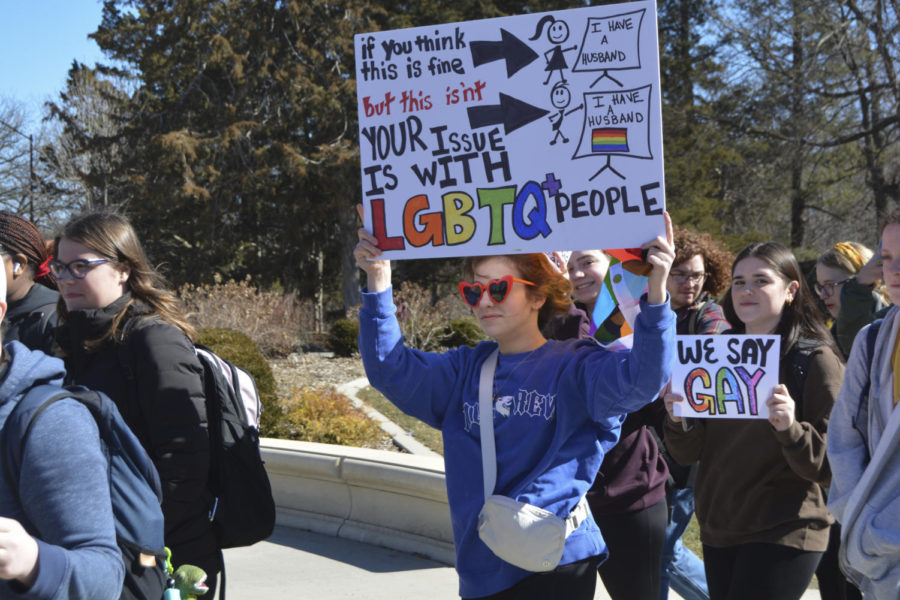Talking about LGBTQ+ legislation in Iowa
Jackie Kluesner, an English education major, holds their sign in the LGBTQIA+ walkout on Iowa State’s campus March 1, 2023.
Iowa has seen a record number of bills impacting the LGBTQ+ community in the current legislative session, two of which were passed in March.
The two bills, SF 538 and SF 482, target transgender individuals. SF 538 prohibits gender-affirming care for minors, while SF 482 bans individuals from entering multi-occupancy restrooms or changing rooms that do not correspond with their biological sex, according to the Iowa Legislature.
Many students, like Marielle MacDonald, a sophomore studying English, feel disgusted by the rise in anti-LGBTQ+ bills.
“I remember thinking that the bills being passed seemed dystopian in a way,” MacDonald said. “I couldn’t believe this was something that was actually happening in my community.”
Twenty-nine bills have been presented to Iowa legislatures, and more than 450 bills have been introduced to legislatures across the country, according to the American Civil Liberties Union (ACLU).
“Bills and legislation like this can create feelings of isolation and wrongness,” said Taylor Velgersdyk, a sophomore studying environmental science. “I worry for my friends and community members who will suffer from these decisions.”
Students feel their emotions continue to build while debates over similar bills ensue.
“I initially had a lot of reactions,” Presley Anstine, a freshman studying English, said. “First it was dread, and then it moved to despair, and then there is this rage that is continuously building.”
These bills have a lasting impact on the LGBTQ+ community, according to MacDonald.
“These bills tell those within the community what they can and cannot do with their own bodies,” MacDonald said. “Forcing someone to go back into the closet or change their identity again to fit the gender binary has severe mental effects.”
LGBTQ+ youth are four times more likely to attempt suicide than their heterosexual or cisgender peers, according to the Trevor Project.
“Forcing younger people to de-transition after they’ve worked so hard to express their identity and their true selves is just cruel,” MacDonald said. “I would not be surprised if the adolescent suicide rate in Iowa rose because of these bills.”
Students like MacDonald feel these bills target transgender individuals, however, other students like Georgie Hilby, refute this statement.
“It’s not targeting transgender individuals, rather protecting them from making a decision they may come to regret,” Hilby, a senior studying agricultural and rural policy studies, said. “It’s important that Iowa stands strong against popular trends that have negative effects on underage children.”
These bills seek to protect Iowans, especially people from younger demographics, according to Hilby.
“I think these bills help keep Iowa standing firm against radical agendas that threaten human nature,” Hilby said. “It also helps protect children faced with social and identity issues from making an unchangeable decision.”
As more bills continue to be introduced, students feel a sense of hopelessness, according to Anstine.
“There is an overwhelming amount of hate being thrown at the LGBTQ+ community,” Anstine said. “I feel scared and unsafe, knowing people out there are filled with so much hate for human beings they don’t know.”
Students can make a difference by writing to senators and representatives, going to protests, holding discussions on campus, and just building community, according to Velgersdyk.
“Be loud,” Velgersdyk said. “Do anything that makes our voices heard and our presence strong.”
Your donation will support the student journalists of the Iowa State Daily. Your contribution will allow us to purchase equipment, send our student journalists to conferences and off-set their cost of living so they can continue to do best-in-the-nation work at the Iowa State Daily.












Somebody Else | May 3, 2023 at 10:09 pm
I have to concur with Hilby in that these sorts of surgeries and other procedures are best not conducted until the body and mind have been able to finish developing. I would not call it hateful that someone who is not yet able to fully understand the consequences of their actions is prevented from engaging in irreversible medical procedures.
Kris | May 3, 2023 at 8:43 am
Hilby obviously knows nothing of the history of transgenderism; it is most certainly not a “trend.” And these bills do not protect transgender folks. That’s as absurd as calling themselves “pro-life” while discounting the life of the mother suffering from an ectopic pregnancy. These anti-LGBTQ+ bills are yet another distraction from the fact that the GOP has no agenda on real issues, like poverty, the terrible water quality and shameful bridge conditions in Iowa.
State legislators continue to send messages that Iowa doesn’t want you or your family members unless they fall in lockstep with the heteronormative cisgender patriarchy. As a result, the brain drain will continue.
David Jackson | May 3, 2023 at 6:45 pm
Why is it the same moralizing slogans and mantras are used by the side of the argument which never rationally debates with facts? Shocking I know.
Not a trend? Where is all the evidence of young people committing suicide for being born in the wrong body for the last 100 years before gender studies rhetoric in our schools, and internet addition at our fingertips? Not to mention the last 6000years plus of recorded history?
Kids who are too young to consent shouldn’t be getting double mastectomies or having their genitals removed, sorry, but regardless of how fulfilling the rhetoric you consume makes you feel about taking advantage of people too young to grasp irreversible consequences, it’s sickening sexual mutilation.